With the rise in healthcare costs and an aging population, there’s steep demand for medical services globally. In the US alone, healthcare spending is projected to reach $6.2 trillion by 2028, with medical billing accounting for a significant portion of that. To keep up with the growing demand and ensure timely and accurate payments, medical practices need to adopt efficient billing practices. This is where medical billing software comes in – providing a streamlined solution to manage medical billing processes. In this blog, we will explore the features and benefits of medical billing software, and why it is essential for modern medical practice.
Quick Read: What is it Billing and their Types, Process, How it Works & Format
TOP 10 best medical billing software
Here’s a list of the 10 best medical billing software:
- AdvancedMD
- Kareo
- DrChrono
- athenaCollector
- NextGen Healthcare
- CollaborateMD
- CureMD
- NueMD
- PracticeSuite
- CareCloud
Quick Read: 11 Best Billing Software for Businesses
10 Best medical billing software – Detailed Explanation
1. AdvancedMD
AdvancedMD is a cloud-based medical billing software that helps medical practices of all sizes to streamline their billing and revenue cycle management processes. The software provides end-to-end revenue cycle management capabilities, including patient scheduling, claims management, payment processing, and reporting.
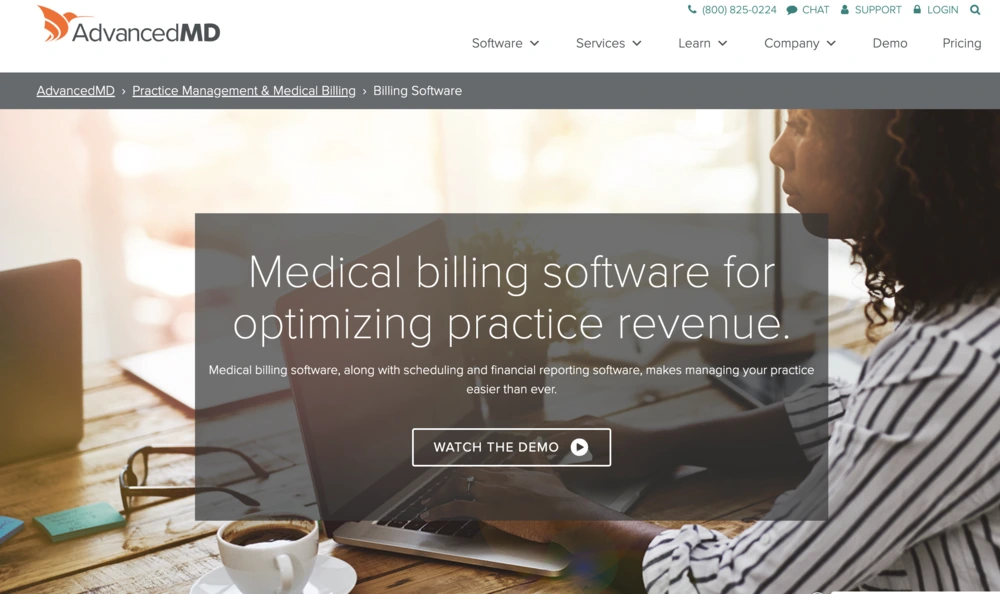
1.1 Benefits
- Automates billing processes and increases efficiency
- Improves revenue cycle management and accelerates payment cycles
- Provides real-time insights and analytics to make informed decisions
- Helps reduce claim rejections and denials
- Offers patient engagement tools to enhance the patient experience
- Supports compliance with HIPAA and other regulatory requirements
1.2 Features
- Patient scheduling and registration
- Claims management and processing
- Payment processing and reconciliation
- Electronic remittance advice (ERA) and electronic funds transfer (EFT)
- Reporting and analytics
- Patient engagement tools
- Inventory management
- Electronic health records (EHR) integration
1.3 Pros and Cons
Pros |
Cons |
|
Easy to use and navigate |
Expensive for small practices |
|
Comprehensive features and capabilities |
Can be overwhelming for new users |
|
Good customer support |
Limited customization options |
|
HIPAA-compliant |
|
|
Robust reporting and analytics |
– |
1.4 Pricing
AdvancedMD offers custom pricing based on the specific needs of the medical practice. Interested customers can contact the vendor for a quote.
1.5 Reviews –
AdvancedMD has an overall rating of 4.5 out of 5 on Capterra and 4.3 out of 5 on Software Advice. Customers praise the software’s ease of use, customer support, and comprehensive features. Some negative reviews mention high pricing and difficulty with customization.
2. Kareo
Kareo is a web-based medical billing and practice management solution designed to help small to medium-sized medical practices. It offers features such as appointment scheduling, electronic claim processing, patient management, and more.
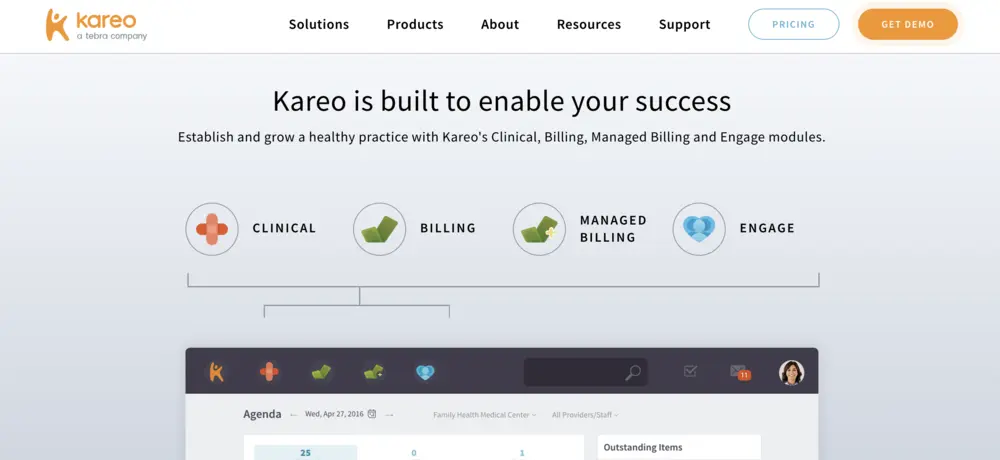
2.1 Benefits
- Streamlined billing process
- Improved revenue cycle management
- Better patient engagement
- Enhanced clinical workflows
- Increased efficiency
2.2 Features
- Appointment scheduling
- Electronic claims processing
- Patient management
- Insurance eligibility verification
- Revenue cycle management
- Electronic health records (EHR)
- Analytics and reporting
2.3 Pros and Cons
Pros |
Cons |
|
User-friendly interface |
Limited customization options |
|
Affordable pricing |
No support for medical credentialing |
|
Integrates with third-party software |
Limited features for larger practices |
|
Good customer support |
Inconsistent software updates |
|
Customizable templates |
– |
2.4 Pricing
Kareo offers different pricing plans based on the specific needs of a medical practice. They offer both monthly and yearly subscription options, with prices starting at $80 per month.
2.5 Reviews –
Kareo has generally positive reviews, with an overall rating of 4.3 out of 5 stars on Capterra. Users praise the user-friendly interface and comprehensive features, but some criticize the lack of customization options and limited features for larger practices.
Quick Read: 11 Best Online Business Payment Solutions
3. DrChrono
DrChrono is a cloud-based electronic health record (EHR) software and medical billing solution designed for small to mid-sized practices. The software provides a suite of integrated practice management tools to help users manage patient data, appointments, clinical notes, and billing operations.
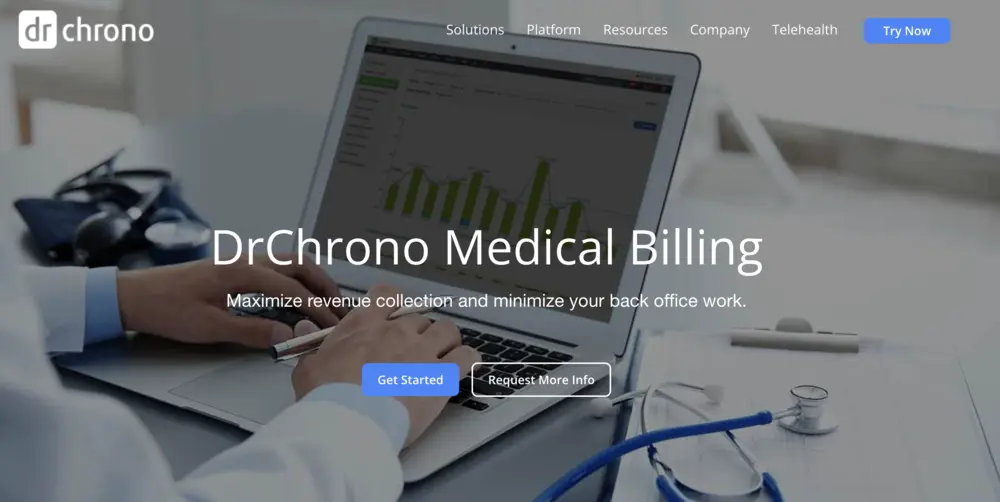
3.1 Benefits
- Streamlined medical billing process
- Improved patient care and engagement
- Customizable EHR templates
- Advanced reporting and analytics
- Mobile-friendly platform
3.2 Features
- Patient management
- Appointment scheduling
- EHR documentation
- Medical billing and revenue cycle management
- Prescription management
- Customizable templates
- Reporting and analytics
- Telemedicine capabilities
3.3 Pros and Cons
Pros |
Cons |
| User-friendly interface | Expensive pricing for some users |
| Customizable templates | Limited third-party integrations |
| Integrated medical billing | Customer support could be improved |
| Advanced reporting and analytics | – |
| Mobile-friendly platform | – |
3.4 Pricing
DrChrono offers tiered pricing plans based on the size and needs of the practice. The pricing starts at $199 per provider per month for the Basic plan, $299 per provider per month for the Professional plan, and $499 per provider per month for the Advanced plan.
3.5 Reviews –
DrChrono has a rating of 4.2 out of 5 stars on Capterra, based on 1,164 reviews, and a rating of 4.0 out of 5 stars on G2, based on 345 reviews. Customers praise the platform’s user-friendly interface, customization options, and integrated billing features, while some criticize the cost and lack of third-party integrations.
4. athenaCollector
athenaCollector is a cloud-based medical billing and revenue cycle management software that helps medical practices to streamline their billing processes, increase revenue, and reduce administrative costs. It is designed for small to large medical practices, including physician practices, medical groups, and healthcare organizations.
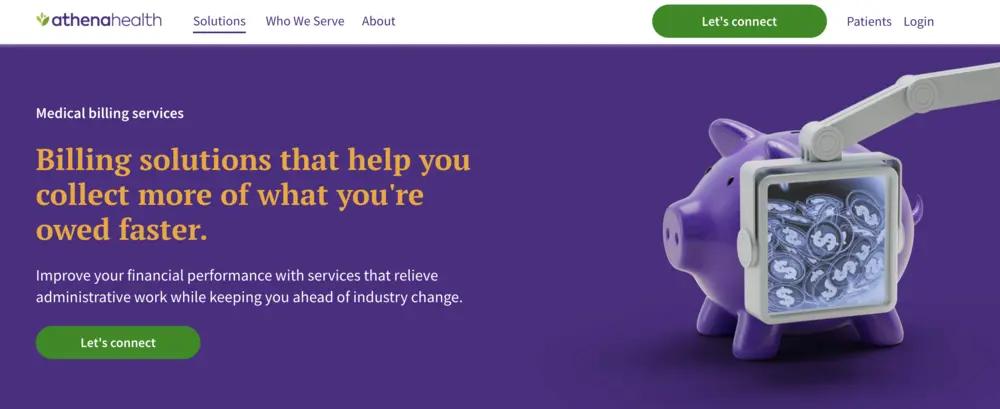
4.1 Benefits
- Streamlined billing and claims management
- Increased efficiency and revenue
- Reduced administrative costs and errors
- Improved patient engagement and experience
- Comprehensive analytics and reporting
4.2 Features
- Automated claims management
- Customizable billing rules and workflows
- Real-time eligibility verification
- Electronic remittance advice (ERA) processing
- Patient and insurance billing
- Patient portal and appointment scheduling
- Revenue cycle management analytics
4.3 Pros and Cons
|
Pros |
Cons |
|
User-friendly interface |
Expensive pricing plans |
|
Comprehensive features and capabilities |
Learning curve for new users |
|
Excellent customer support |
Limited customization options for reporting and analytics |
|
Customizable workflows |
– |
|
Easy integration with other systems |
– |
4.4 Pricing
athenaCollector offers customized pricing based on the needs of the medical practice. Interested users can contact the vendor for a quote.
4.5 Reviews –
- Capterra: 4.5/5
- Software Advice: 4.47/5
- G2: 4.2/5
5. NextGen Healthcare
NextGen Healthcare is a cloud-based healthcare solution designed for small to large medical practices. The software offers tools for revenue cycle management, electronic health records, practice management, and patient engagement.
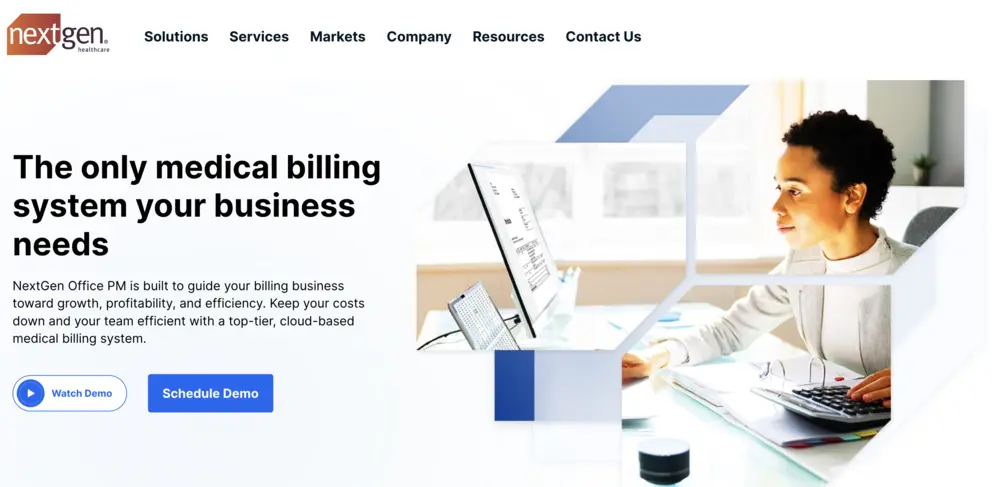
5.1 Benefits
- Streamlines workflows and increases efficiency
- Reduces billing errors and denials
- Offers patient engagement tools
- Provides robust reporting and analytics capabilities
- Offers customizable templates and workflows
- Ensures HIPAA compliance
5.2 Features
- Revenue cycle management
- Electronic health records
- Practice management
- Patient engagement
- Reporting and analytics
- Mobile app
5.3 Pros and Cons
Pros |
Cons |
|
Streamlines workflows and increases efficiency |
Expensive pricing |
|
Reduces billing errors and denials |
Learning curve for new users |
|
Offers patient engagement tools |
Limited customization options for reporting and analytics |
|
Provides robust reporting and analytics capabilities |
– |
|
Offers customizable templates and workflows |
– |
|
Ensures HIPAA compliance |
– |
5.4 Pricing
Pricing information for NextGen Healthcare is not publicly available. Interested users can contact the vendor for a quote.
5.5 Reviews –
- Capterra: 4.1/5
- Software Advice: 4.06/5
- G2: 4.1/5
Quick Read: 9 Best Vendor Payment Management Software
6. CollaborateMD
CollaborateMD is a cloud-based medical billing and practice management software that helps medical practices streamline their workflows and improve revenue cycle management.
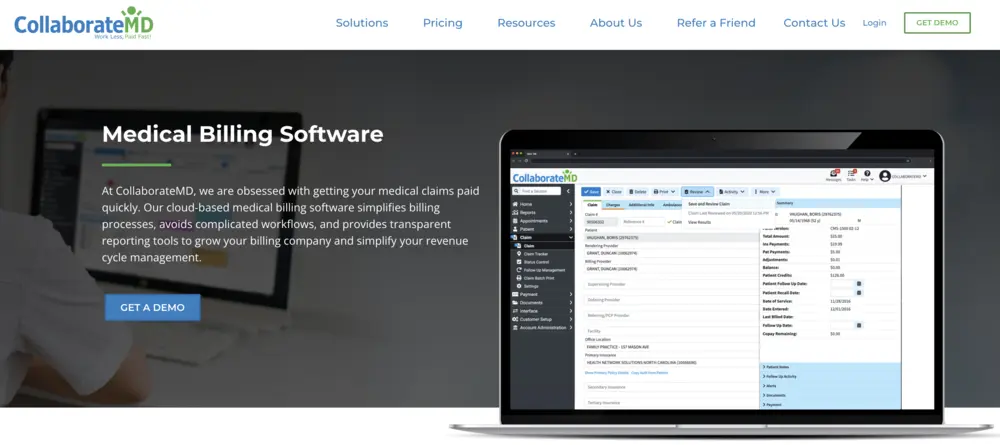
6.1 Benefits
- Improves efficiency by automating tasks and workflows
- Streamlines revenue cycle management
- Enhances accuracy and reduces errors
- Provides real-time reports and analytics
- Supports HIPAA compliance
6.2 Features
- Appointment scheduling and patient management
- Claims management and submission
- Electronic remittance advice (ERA) and payment posting
- Revenue cycle analytics and reporting
- Customizable billing and coding rules
- Automated patient statements and collections
6.3 Pros and Cons
Pros |
Cons |
|
Affordable pricing plans |
Limited customization options for reports and templates |
|
Easy to learn and use |
Some features require additional fees |
|
Excellent customer support |
Some users report occasional glitches and bugs |
|
Comprehensive features and capabilities |
– |
|
Integration with other systems |
– |
6.4 Pricing
CollaborateMD offers customized pricing plans based on the needs and size of the medical practice.
6.5 Reviews –
CollaborateMD has generally positive reviews with an average rating of 4.5 out of 5 on software review platforms. Users appreciate the ease of use, affordability, and excellent customer support. However, some users report occasional issues with billing and claims processing.
7. CureMD
CureMD is a cloud-based EHR and medical billing software designed for healthcare practices of all sizes. It offers a wide range of features, including appointment scheduling, e-prescribing, lab orders and results, patient portals, and revenue cycle management.
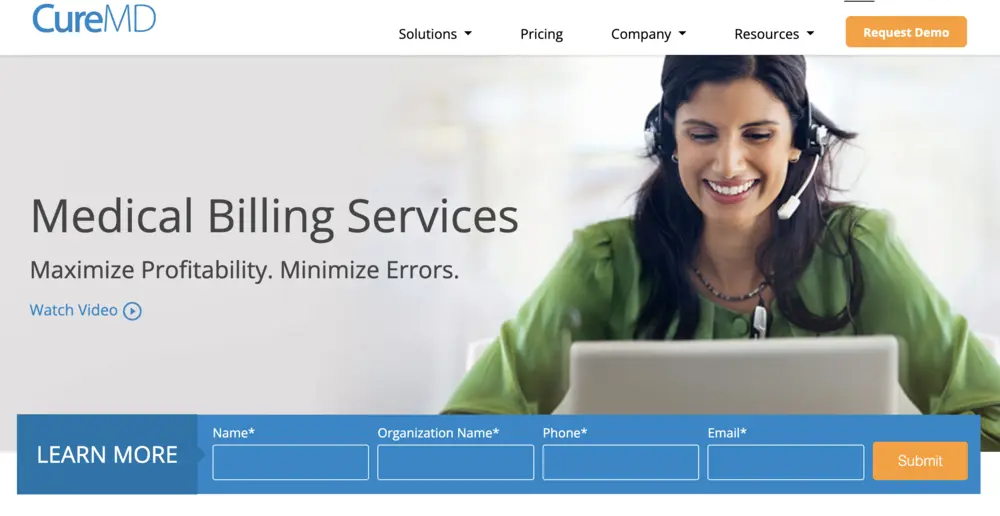
7.1 Benefits
- Streamlined workflows and reduced administrative burden
- Improved patient care and outcomes
- Enhanced revenue cycle management and financial performance
- HIPAA-compliant and secure data storage
- Scalable and customizable to meet the needs of any practice
7.2 Features
- EHR and practice management
- Revenue cycle management
- Patient engagement and communication tools
- Analytics and reporting
- E-prescribing
- Lab orders and results management
7.3 Pros and Cons
Pros |
Cons |
|
Comprehensive features and capabilities |
Higher pricing plans than some competitors |
|
Customizable workflows and templates |
Some users report occasional glitches and bugs |
|
Excellent customer support |
Learning curve for new users |
|
Easy to use and navigate interface |
Limited customization options for reports and templates |
|
Cloud-based and mobile-friendly |
– |
|
HIPAA-compliant and secure |
– |
7.4 Pricing
CureMD does not publicly disclose pricing information on their website. Interested users can request a demo or contact sales for more information.
7.5 Reviews –
CureMD has received positive reviews on various software review sites, with an average rating of 4 out of 5 stars. Users appreciate its comprehensive features, customizable workflows, and excellent customer support. However, some users note that the learning curve can be steep and that it can be expensive for smaller practices.
8. NueMD
NueMD is a cloud-based medical billing and practice management software that provides solutions for small to medium-sized practices. It includes a range of features such as appointment scheduling, medical billing, electronic health records (EHR), and reporting.
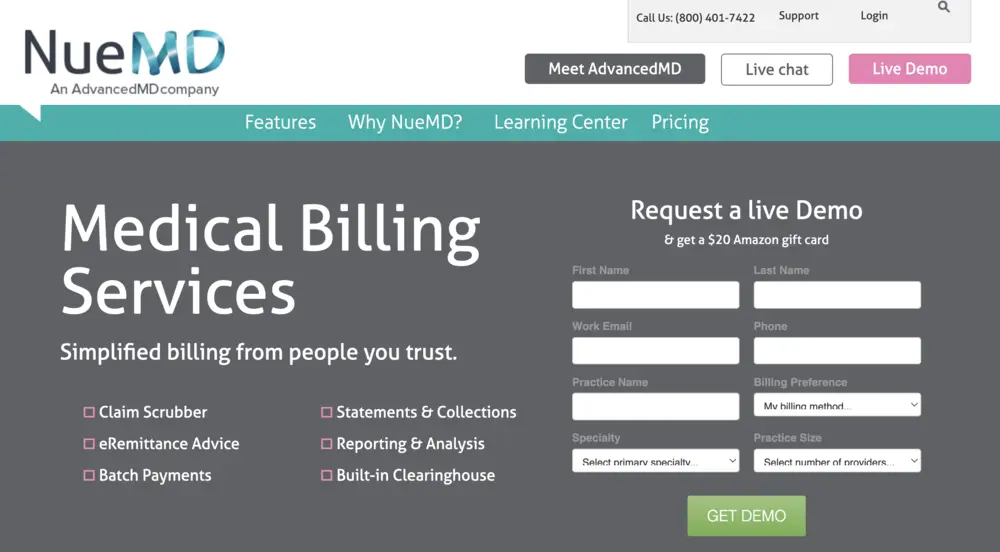
8.1 Benefits
- Streamlined practice management and billing processes
- Improved accuracy and efficiency in billing and documentation
- Access to patient records from anywhere at any time
- Customizable templates and workflows
- HIPAA-compliant and secure
- Good customer support
8.2 Features
- Appointment scheduling
- Medical billing and claims management
- Electronic health records (EHR)
- Patient portal and messaging
- Reporting and analytics
- Revenue cycle management
- Customizable templates and workflows
- HIPAA-compliant and secure
8.3 Pros and Cons
Pros |
Cons |
|
Easy to use and navigate |
Limited customization options for reports and templates |
|
Comprehensive features and capabilities |
Some users report occasional glitches and bugs |
|
Affordable pricing plans |
Learning curve for new users |
|
Good customer support |
– |
|
HIPAA-compliant and secure |
– |
8.4 Pricing
NueMD offers pricing plans starting at $149 per provider per month for medical billing and $249 per provider per month for the complete practice management suite. There is also an additional one-time setup fee of $299 for new users.
8.5 Reviews
NueMD has generally positive reviews, with users praising its ease of use, comprehensive features, and good customer support. Some users have reported occasional technical issues and a steep learning curve for new users.
Quick Read: 12 Best Invoicing Software for Your Business
9. PracticeSuite
PracticeSuite is a cloud-based medical practice management software that offers an all-in-one solution for healthcare providers.

9.1 Benefits
- Streamlines medical billing and revenue cycle management
- Enhances patient engagement and experience
- Simplifies scheduling and appointment management
- Provides robust reporting and analytics
- Offers customizable workflows and templates
9.2 Features
- Electronic health records (EHR)
- Medical billing and coding
- Appointment scheduling and reminders
- Patient portal and communication
- Revenue cycle management
- Reporting and analytics
- Telemedicine
- Electronic prescriptions
9.3 Pros and Cons
Pros |
Cons |
|
Easy to use and navigate |
Limited customization options for reports and templates |
|
Comprehensive features and capabilities |
Some users report occasional glitches and bugs |
|
Affordable pricing plans |
Learning curve for new users |
|
Good customer support |
– |
|
Customizable workflows and templates |
– |
|
HIPAA-compliant and secure |
– |
|
Telemedicine capabilities |
– |
|
Robust reporting and analytics |
– |
9.4 Pricing
PracticeSuite offers a free trial and custom pricing based on the needs and size of the healthcare practice.
9.5 Reviews
According to customer reviews, PracticeSuite is highly rated for its ease of use, comprehensive features, and excellent customer support. Some users note occasional technical issues, but overall, PracticeSuite is a highly recommended medical practice management solution.
10. CareCloud
CareCloud is a cloud-based medical billing software that helps healthcare organizations to streamline their operations, improve financial performance, and provide better patient care.
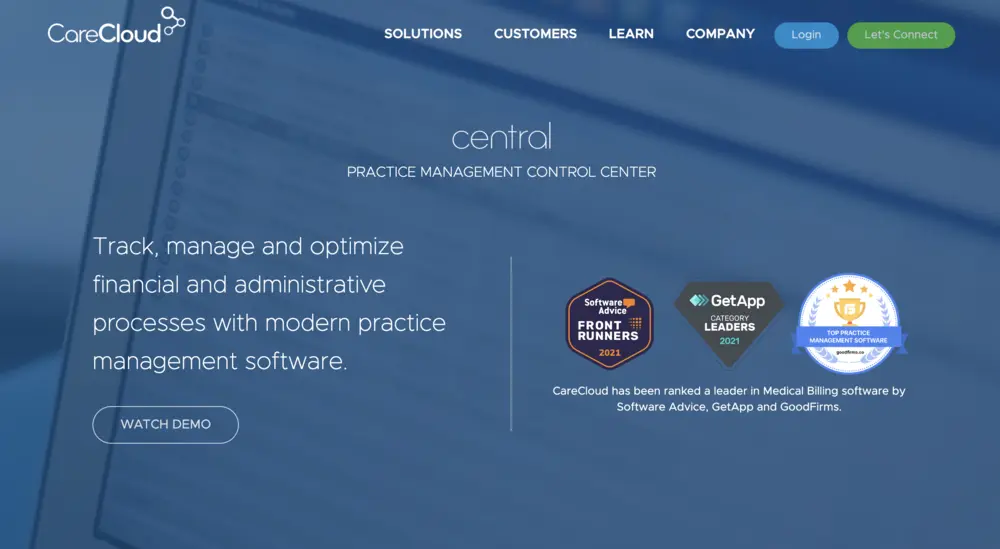
10.1 Benefits
- Improve efficiency and productivity
- Increase revenue and profitability
- Enhance patient engagement and satisfaction
- Ensure compliance and security
- Access to real-time data and insights
10.2 Features
- Electronic health records (EHR)
- Medical billing and revenue cycle management
- Patient scheduling and registration
- Telemedicine
- Analytics and reporting
- Patient portal
- Customizable templates and workflows
- HIPAA-compliant and secure
10.3 Pros and Cons
Pros |
Cons |
|
Easy to use and navigate |
Limited customization options for reports and templates |
|
Comprehensive features and capabilities |
Some users report occasional glitches and bugs |
|
Affordable pricing plans |
Learning curve for new users |
|
Good customer support |
– |
|
Customizable workflows and templates |
– |
|
HIPAA-compliant and secure |
– |
|
Telemedicine capabilities |
– |
|
Robust reporting and analytics |
– |
10.4 Pricing
CareCloud offers three pricing plans:
- Breeze: starting at $349/month/provider
- Advanced: custom pricing
- Pro: custom pricing
10.5 Reviews –
According to customer reviews on Capterra, CareCloud has an overall rating of 4.1 out of 5, with users praising its user-friendly interface, comprehensive features, and excellent customer support. Some users reported occasional glitches and bugs, but overall, CareCloud is a well-regarded medical billing software.
What is medical billing software?
Medical billing software is a type of technology that automates the process of medical billing and revenue management for healthcare providers. It helps healthcare practices to manage their billing operations by creating and submitting claims, verifying insurance eligibility, processing payments, and generating reports.
The software is designed to streamline the billing process and reduce errors, thereby increasing the efficiency of healthcare operations. It can be used by hospitals, clinics, and other healthcare facilities to manage their billing activities and ensure timely reimbursement for services provided.
Types of medical billing software
There are three main types of medical billing software. They are:
1. Web-based medical billing software
Web-based medical billing software, also known as cloud-based medical billing software, is hosted on the provider’s servers and can be accessed from anywhere with an internet connection. These systems typically require a monthly subscription fee, and updates are performed automatically by the provider.
2. Client-server medical billing software
It is installed directly onto a provider’s local computer network. The provider manages all updates and maintenance, and there is usually a one-time fee for the software purchase. These systems typically offer more customization options than web-based software.
3. Standalone medical billing software
The software is designed specifically for medical billing and coding and is not part of a larger practice management or electronic health record (EHR) system. These systems often offer robust reporting and analytics features and may be used in conjunction with other software systems. They can be web-based or client-server based.
Each type of medical billing software has its own set of advantages and disadvantages, and the choice depends on the specific needs and preferences of the healthcare provider.
Quick Read: Billing Cycle: What is it, Types, Duration and How Does it Work?
Importance of medical billing software
Medical billing software is important for healthcare providers and medical billing companies because it automates and streamlines the medical billing process, making it more efficient and accurate.
The software helps in creating, submitting, and tracking medical claims and payments, reducing the need for manual data entry and paper-based billing. With medical billing software, healthcare providers can also ensure compliance with regulatory requirements, such as HIPAA and ICD-10, which are critical for patient privacy and billing accuracy.
In addition, medical billing software can help providers analyze and improve their revenue cycle management, leading to better financial outcomes for the practice or organization. Overall, medical billing software plays a vital role in the modern healthcare landscape, helping providers deliver quality care while maintaining financial sustainability.
What are the benefits of medical billing software?
Medical billing software plays a crucial role in modern healthcare organizations by automating and streamlining the medical billing process. It offers many benefits, such as:
1. Improved accuracy
Medical billing software reduces errors and inaccuracies that may occur during manual data entry, thus reducing the chances of denied claims and payment delays.
2. Increased efficiency
The software automates many tasks such as creating invoices, sending claims, and tracking payments, which saves time and increases efficiency.
3. Enhanced financial management
Medical billing software helps healthcare organizations manage their finances effectively by providing real-time information about payments and outstanding balances.
4. Better patient care
By reducing the administrative workload, medical billing software allows healthcare professionals to focus more on patient care, resulting in improved outcomes.
5. Compliance with regulations
Medical billing software ensures compliance with healthcare regulations, such as HIPAA and ICD-10 coding, which helps healthcare organizations avoid legal issues.
Quick Read: Billing Statement: What is it, Components, Formats & How to Create?
How to choose the best medical billing software for your business?
Choosing the best medical billing software can be a daunting task. To help you make an informed decision, here are some points to consider:
- Features: Look for software that offers comprehensive features that meet the needs of your practice. Consider the specific needs of your practice, such as patient scheduling, claims management, reporting, and analytics.
- Customization: Choose a software that is customizable to fit the unique needs of your practice. This includes customizing workflows, templates, and reports.
- Ease of use: Look for software that is easy to learn and use. It should have a user-friendly interface and require minimal training for your staff.
- Integration: Choose a software that can integrate with your existing systems and tools, such as electronic health records (EHRs) and practice management software.
- Security: Ensure that the software is HIPAA-compliant and offers robust security features to protect patient data and sensitive information.
- Customer support: Look for software that offers excellent customer support. This includes options for online support, phone support, and training resources.
- Pricing: Choose software that offers affordable pricing plans that fit within your budget. Be sure to consider any additional fees, such as setup fees, training fees, and ongoing support fees.
By considering these points, you can choose the best medical billing software for your business that will streamline your billing processes, improve efficiency, and help you achieve your business goals.
Make corporate T&E management a breeze with Happay
Happay is a leading expense management solution that revolutionizes the way businesses manage their expenses. With Happay, you can automate and streamline your expense management process, saving valuable time and resources. Say goodbye to manual paperwork, lost receipts, and delayed reimbursements. Happay gives you complete control over your expenses, allowing you to set budgets, manage approvals, and track expenses in real-time.
With advanced reporting and analytics, you can gain valuable insights into your spending patterns, enabling you to make informed decisions to optimize your business operations. Join the thousands of businesses that have already transformed their expense management with Happay, and experience hassle-free expense management like never before.
Quick Read: 10 Best Expense Management Software
FAQs
Medical billing and coding software is a type of software that helps healthcare providers manage medical billing processes and maintain accurate patient records.
There are various billing methods used in medical billing, including fee-for-service, capitation, bundled payments, and value-based payments.
Hospitals need billing software to streamline the medical billing process, reduce errors, improve efficiency, and maximize revenue. Medical billing software automates tasks such as claims submission, patient eligibility verification, and payment processing.
There are typically two main types of hospital billing: inpatient billing and outpatient billing.
Inpatient billing refers to the billing of services and treatments provided to patients who are admitted to the hospital and stay for an extended period of time, while outpatient billing refers to the billing of services provided to patients who receive care and treatment on an outpatient basis and do not require an overnight stay.



Discussion about this post